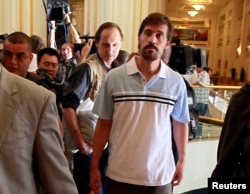Following the deaths of American journalists James Foley and Steven Sotloff, a debate has arisen about whether the U.S. should have paid ransom to the Islamic State group in exchange for their release.
Reports have said that Islamic State demanded millions of dollars prior to its on-camera execution of Foley. It is not known if similar demands were made for the release of Sotloff before his murder.
Philip Balboni, president of GlobalPost, the online news agency that hired James Foley, said Foley’s parents knew that the U.S. government prohibitted paying ransom to kidnappers, and they were trying to rescue their son by raising funds. He said U.S. authorities were fully aware of the efforts by Foley’s parents, but did not stop them.
“The family was committed to raising the funds to pay a ransom. The captors never definitely stated an amount. It was never in final negotiation. It was clear from the very first instance that the family would pay that ransom if they were given that opportunity,” he said.
Deborah Pearlstein, professor at Yeshiva University Cardozo School of Law, said there currently was no law that prohibits the U.S. government from paying ransom to or negotiating with the terrorist groups.
“In principle, Congress could pass a law that prohibited the executive [branch] from doing that, but it never has. So when the United States government says: we don’t negotiate with terrorists or we don’t pay ransoms or things of that nature, they are making statements about U.S. policy, not something they are compelled to do by law,” she said.
But John O. McGinnis, professor at Northwestern University School of Law, noted it would be against the law to give money to certain groups even if ransom payments were not illegal.
“I think as a general matter, U.S. law does not prevent private people from paying money to kidnappers, at least [according to] federal law. But it would prevent them from paying ransom to al-Qaida or other terrorist entities that are prohibited from receiving U.S. funds by Treasury regulations,” he said.
Daniel Benjamin, a former counterterrorism coordinator at the U.S. Department of State and the current director of the John Sloan Dickey International Exchange Center at Dartmouth College, said the laws have never been enforced by the U.S. government in cases of ransom.
“As a technical matter, I guess, the U.S. could prosecute people for supporting terrorism if they pay ransoms, but the government has chosen not to do that because it would be very unpopular to penalize people who had a tragedy such as a kidnapping in their family,” he said.
At present, there are many international treaties and U.N. Security Council resolutions that prohibit funds from being sent to terrorist organizations.
However, to date, no individual or company has been subjected to legal sanctions because of paying ransom to terrorist organizations in exchange for a family member or employee.
This report was produced in collaboration with VOA's Mandarin service.





